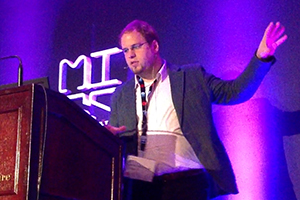UOIT Game Development and Entrepreneurship students and faculty attend largest gaming conference in Canada
November 28, 2012

A group of 55 students from the Faculty of Business and Information Technology (FBIT) has gained unique insight into the game development industry after representing the University of Ontario Institute of Technology (UOIT) at the International Game Summit (MIGS) in Montreal, Quebec. All of the students are in the Game Development and Entrepreneurship specialization within the Bachelor of Information Technology program at UOIT.
“This is the third year that FBIT has offered the unique hands-on learning experiences of the MIGS conference to our Game Development and Entrepreneurship students,” said Dr. Pamela Ritchie, Dean, FBIT. “Attending MIGS provides students with the outstanding opportunity to participate in relevant lectures, workshops and networking events.”
The students were joined in Montreal by FBIT faculty members Dr. Andrew Hogue and Dr. Lennart Nacke. As part of the conference, Dr. Nacke made a presentation on Biofeedback Gaming: The Future of Game Interaction.
Initially created in 2004, MIGS is a conference designed to develop expertise and knowledge transfer as well as promote the trade and business development among industry stakeholders.
The 2012 conference, which attracted more than 1,700 attendees, focused on the six main disciplines of the game industry: arts, visual effects, audio, design, production, and technology. A business lounge, an exhibition zone, a career fair, an art gallery and several other social activities made this conference the biggest event in Canada dedicated to gaming professionals.



